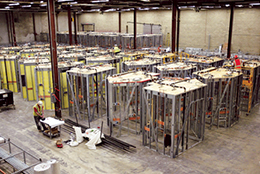| April 2015 | ||
 Print Print  Email Email |
Archive | |

| www.ibew.org |
|
 |
|

|

The latest revolution in the commercial construction industry came in waves of trucks transporting prefabricated concrete walls and floors to construction sites. On those sites, the dwindling lines of cement trucks and fewer workers in black boots floating and finishing concrete were probably noted by all, but mostly taken to heart by the trades affected. Today, similar market forces are altering the nature of electrical work in the construction industry — in a big way. It used to be that construction was predominantly done outdoors, within often harsh, unpredictable elements; no longer. Whether it is called prefabrication or modularization, a growing segment of construction work is taking on the characteristics normally associated with manufacturing. Mass production and "lean" manufacturing techniques that increased the competitiveness of domestic industries like automobiles are being increasingly applied to electrical construction. Electricians are constructing whole floors of hospitals, office buildings and even nuclear power plants on the ground in climate-controlled warehouses, only later installing them in the nearly finished structures. Labor and material costs are lower and time at the job site is reduced. For employers hoping to gain the upper hand in tight competition with nonunion companies, prefab will be an important tool, says IBEW International Representative John Bourne, who works on business development. The marriage of construction and manufacturing has major consequences for contractors, electricians, the IBEW and the Electrical Training Alliance (formerly the NJATC). "It's hard for some of us veteran electricians to get our heads around prefab," says Bourne. "But the bottom line is no one is better suited to master these methods and technology than IBEW members. If we don't, our contractors will lose big projects. When a customer is building a billion-dollar hotel, he is looking to reduce construction time. That's where prefab comes in. Mastering prefabrication is all about gaining more projects to keep more journeymen and apprentices working." |

|
© Copyright 2015 International Brotherhood of Electrical Workers | User Agreement and Privacy Policy | Rights and Permissions |